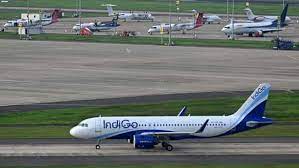New Delhi, Oct 27: Aviation regulator DGCA has allowed IndiGo to wet lease wide-body Boeing planes from Turkish Airlines for up to six months and has rejected the domestic carrier’s request for leasing the aircraft for up to two years, according to sources.
The Directorate General of Civil Aviation (DGCA) turned down the request of the country’s largest airline to wet lease the aircraft for a longer period, citing that the move could become diversion of traffic rights in collusion with a strong foreign carrier that will mainly feed the latter’s hub abroad with more passengers from India, the sources said.
IndiGo, which currently has only narrow-body planes in its fleet, decided to lease wide-body aircraft to operate more flights on international routes to meet rising demand.
Currently, there are also supply issues from engine makers Pratt & Whitney and CFM as a result of which many Airbus A320 planes of IndiGo and Go First are on the ground.
The sources said DGCA has permitted IndiGo to wet lease wide-body aircraft from Turkish Airlines for three months and the period can be extended by another three months.
The domestic airline’s request for wet leasing the aircraft for up to two years has been rejected by the watchdog.
There was no immediate comment from IndiGo.
Generally, wet leasing of planes is allowed for short periods to tackle supply constraints and ensure that airfares do not surge significantly.
Under wet lease arrangement, planes are leased among with operating crew and engineers.
On October 12, PTI reported that IndiGo will soon be leasing up to four four wide-body Boeing 777 planes to cover the shortfall in its international operations.
According to the sources, wet leasing of an aircraft essentially means an Indian airline is only issuing tickets for aircraft being operated by the carrier from which the planes have been taken.
Also, the entire operating crew and engineers would be from the foreign airline concerned. DGCA does not have adequate safety oversight on aircraft being operated under wet lease arrangement, the sources said.
At present, bilaterals between India and Turkey provide for only two flights daily to be operated by airlines from either side.
The government is also looking at mega aviation hubs in India and is also encouraging domestic airlines to have wide-body planes in their fleets. (PTI)
Trending Now
E-Paper


